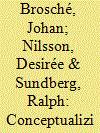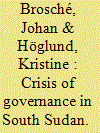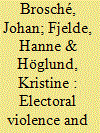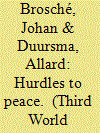|
|
|
Sort Order |
|
|
|
Items / Page
|
|
|
|
|
|
|
| Srl | Item |
| 1 |
ID:
192018


|
|
|
|
|
| Summary/Abstract |
Civil wars that appear to observers to be the most complex—even using a colloquial understanding of the concept—are also those that seem to register the most intense fighting, the most prolonged spells of war, and the most resistance to durable conflict resolution. But what does it really mean for a civil war to be complex? We currently lack a concept of “civil war complexity” that can help us better understand the most important variations in civil wars across time and space. To address this gap we develop a conceptualization of “civil war complexity” consisting of three dimensions—“actor complexity,” “behavior complexity,” and “issue complexity”—and demonstrate how they manifest empirically. We also highlight this conceptualization’s utility—and the danger of overlooking it—through the case of Darfur. This conceptualization paves the way for a new research agenda that explores how civil wars differ in terms of their complexity, the causes and consequences of civil war complexity, and how to refine conflict resolution techniques and strategies.
|
|
|
|
|
|
|
|
|
|
|
|
|
|
|
|
| 2 |
ID:
145957


|
|
|
|
|
| Summary/Abstract |
Since mid-December 2013, thousands of people have been killed in armed conflict in South Sudan. The fighting is entrenched in a power struggle between the main political contenders ahead of elections which were scheduled for 2015. This article examines the violence in South Sudan since the North–South war ended with a focus on the consequences of the introduction of electoral politics. Our research contributes to the literature on state-building and peace-building in war-torn societies, by exploring how the extreme levels of violence are linked to three groups of factors. First, the stakes involved in being part of the government are extremely high, since it is the only way to secure political and economic influence. Second, the actors involved in political life are dominated by individuals who held positions within the rebel groups, which increases the risk of political differences turning violent. Third, the institutions important for a legitimate electoral process, and which work to prevent violence, are weak or non-existent.
|
|
|
|
|
|
|
|
|
|
|
|
|
|
|
|
| 3 |
ID:
170808


|
|
|
|
|
| Summary/Abstract |
Why do the first multiparty elections after authoritarian rule turn violent in some countries but not in others? This article places legacies from the authoritarian past at the core of an explanation of when democratic openings become associated with electoral violence in multi-ethnic states, and complement existing research focused on the immediate conditions surrounding the elections. We argue that authoritarian rule characterized by more exclusionary multi-ethnic coalitions creates legacies that amplify the risk of violent elections during the shift to multiparty politics. Through competitive and fragmented interethnic relations, exclusionary systems foreclose the forging of cross-ethnic elite coalitions and make hostile narratives a powerful tool for political mobilization. By contrast, regimes with a broad-based ethnic support base cultivate inclusive inter-elite bargaining, enable cross-ethnic coalitions, and reduce incentives for hostile ethnic mobilization, which lower the risk of violent elections. We explore this argument by comparing founding elections in Zambia (1991), which were largely peaceful, and Kenya (1992), with large-scale state-instigated electoral violence along ethnic lines. The analysis suggests that the type of authoritarian rule created political legacies that underpinned political competition and mobilization during the first multiparty elections, and made violence a more viable electoral strategy in Kenya than in Zambia.
|
|
|
|
|
|
|
|
|
|
|
|
|
|
|
|
| 4 |
ID:
158921


|
|
|
|
|
| Summary/Abstract |
Why do some peace agreements end armed conflicts whereas others do not? Previous studies have primarily focused on the relation between warring parties and the provisions included in peace agreements. Prominent mediators, however, have emphasised the importance of stakeholders at various levels for the outcome of peace agreements. To match the experience of these negotiators we apply a level-of-analysis approach to examine the contextual circumstances under which peace agreements are concluded. While prominent within the causes of war literature, level-of-analysis approaches are surprisingly scant in research about conflict resolution. This article compares two Sudanese Peace Agreements: the Comprehensive Peace Agreement (2005) that ended the North–South war and led to the independence of South Sudan, and the Darfur Peace Agreement (2006) which failed to end fighting in Darfur. We find that factors at the local, national and international level explain the different outcomes of the two agreements. Hence, the two case studies illustrate the merit of employing a level-of-analysis approach to study the outcome of peace agreements. The main contribution of this article is that it presents a new theoretical framework to understand why some peace agreements terminate armed conflict whereas others do not.
|
|
|
|
|
|
|
|
|
|
|
|
|
|
|
|
|
|
|
|
|